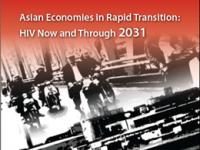
Feature Story
Economic Progress not enough to change the future course of the epidemic: AIDS in Asia needs bold policy changes
20 August 2009
20 August 2009 20 August 2009
Six Asian countries experiencing rapid economic transition have yet to prioritize HIV prevention resources for high-impact programmes. Political will and social acceptance will be needed to allocate resources for HIV services for sex workers and their clients, injecting drug users and men who have sex with men.
These are the key findings of a study focusing on China, India, Indonesia, Malaysia, Thailand, and Vietnam, carried out under the auspices of the aids2031 initiative.
The study, Asian Economies in Rapid Transition: HIV Now and Through 2031, was launched at the 9th International Congress on AIDS in Asia-Pacific. The report underlines the demographic, economic and social transformation taking place in the six countries and makes an attempt to analyze and project how these rapid changes may impact the spread of HIV in years to come. It also recommends some critical and sustainable long-term measures that will need to be adopted in order to curb the epidemic and its impact in these six countries.
The six countries studied are expected to increase their gross domestic product (GDP) per capita by between 3 and 10 percent per annum over the next 25 years, leading to higher public revenues and health spending. By 2031, each of these countries will need less than a quarter of a percentage point of GDP to pay for universal access to HIV prevention, care, and treatment. Funding for AIDS programmes will need less than one percent of the public health budget, except for Indonesia.
New trends in these six countries are changing the future scenario of the HIV epidemic. The boom in information and communication technologies, heavy migration and population mobility, rising spending power, and the growing use of recreational drugs may lead to an increase in sexual risk behaviors. The impact of these emerging trends on young people, a growing segment of the population in these six countries, is a particular concern.
Policy support and financial resources for interventions targeting most-at-risk populations must go hand in hand to implement innovative outreach programmes, according to the report. At the same time, a human rights perspective is needed to contain the social prejudice and stigma that may prevent these services to reach the most vulnerable groups.
‘If the AIDS epidemic is to be curbed,” says Prof. Myung-Hwan Cho, the Co-chair of the Working Group, “the governments in these countries will need to commit their growing resources and summon the political will to adapt policies and develop sound programmatic approaches that address inequalities, stigma and discriminatory practices”.
Asian Economies in Rapid Transition: HIV Now and Through 2031 is the first report to be launched by aids2031, an international think tank which generates new thinking on what must be done now to better manage AIDS epidemic by the year 2031.
Economic Progress not enough to change the future
External links:
Publications:
Asian Economies in Rapid Transition: HIV Now and Through 2031 (pdf, 1.63 Mb.).



